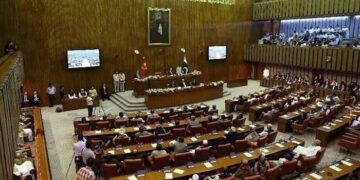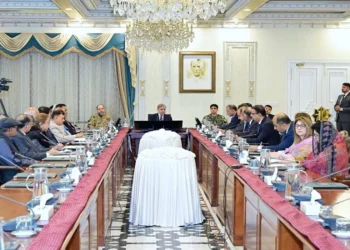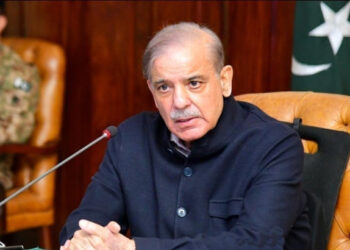ISLAMABAD; The Senate on Tuesday passed the Anti-Terrorism (Amendment) Bill, 2025 with a majority vote, rejecting amendments proposed by JUI-F Senator Kamran Murtaza despite vocal protests from the opposition benches. The legislation, moved by Minister of State for Interior and Narcotics Control Talal Chaudhry, had already cleared the National Assembly and is designed to strengthen Pakistan’s counter-terrorism framework.
According to the bill’s objectives, Pakistan’s current security climate necessitates stronger measures that go beyond the existing Anti-Terrorism Act of 1997. The amendments give the government, armed forces, and civil armed forces expanded authority to detain individuals suspected of posing serious threats to national security. Such preventive detention, based on credible intelligence or reasonable suspicion, is aimed at thwarting terrorist plots before they materialize. The law also allows the formation of Joint Interrogation Teams (JTIs), bringing together multiple intelligence and enforcement agencies to conduct comprehensive inquiries and gather actionable intelligence.
Alongside the anti-terror bill, the Upper House unanimously approved two additional pieces of legislation: the Pakistan Land Port Authority Bill, 2025 and the Petroleum (Amendment) Bill, 2025.
Debate in the House
During the session, Minister for Law and Justice Azam Nazeer Tarar defended the anti-terror amendments, noting that input from PPP lawmaker Syed Naveed Qamar had already been incorporated to strengthen the bill. He stressed that the legislation had passed judicial scrutiny and contained a three-year sunset clause. Under Clause 2, detainees must be presented before a judge within 24 hours, in line with constitutional safeguards.
Senator Irfan Siddiqui of the PML-N strongly backed the bill, warning against any leniency toward terrorists. He reminded the House that Pakistan had sacrificed nearly 100,000 lives to terrorism and could not afford to allow militants free rein. Referring to recent attacks such as those on passenger trains and targeted killings, Siddiqui said these acts threatened the country’s federation and undermined public trust in the state. He also condemned the mistreatment of political leaders, recalling his own imprisonment and empathizing with others who had faced harsh treatment, including PTI leaders.
However, PTI’s Barrister Syed Ali Zafar argued that while his party opposed terrorism, certain provisions in the bill contradicted the Constitution and should be reviewed by a committee. PTI’s Noorul Haq Qadri and JUI-F’s Kamran Murtaza echoed similar concerns, urging that the draft be referred to the standing committee or the Council of Islamic Ideology for detailed scrutiny.
Petroleum (Amendment) Bill, 2025
The Petroleum (Amendment) Bill introduces digital tracking of petroleum products using real-time monitoring systems. Deliveries to storage facilities and filling stations will be logged electronically to prevent smuggling and illegal trade. The law prescribes strict penalties, including fines ranging from Rs1 million to Rs100 million and the seizure of machinery, storage tanks, and vehicles used in unlawful activities. Repeat offenders face even harsher penalties, including licence cancellation.
A six-month grace period will be allowed if licences expire or are cancelled, while renewal applications must be processed within one month. Appeals may be filed with the Petroleum Division’s Secretary in case of disputes. Deputy commissioners are empowered to seize illegal stockpiles, ensuring stronger enforcement.
The statement of the bill emphasizes that technology-driven monitoring will help curb widespread smuggling and strengthen regulatory oversight of petroleum trade.

























